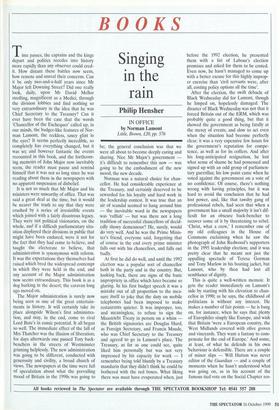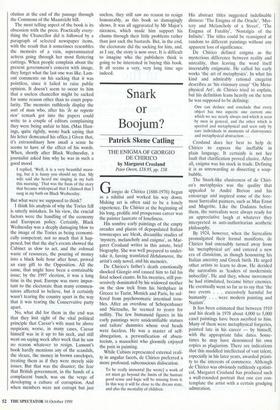BOOKS
Singing
in the
rain
Philip Hen s her
IN OFFICE by Norman Lamont Little, Brown, £20, pp. 576
Time passes, the captains and the kings depart and politics recedes into history more rapidly than any observer could cred- it. How distant these battles now seem, how remote and unreal their concerns. Can it be only two-and-a-half years since Mr Major left Downing Street? Did one really look, daily, upon Mr David Mellor strolling, magnificent as a Medici, through the division lobbies and find nothing so very extraordinary in the idea that he was Chief Secretary to the Treasury? Can it ever have been the case that the words 'Chancellor of the Exchequer' called up, in our minds, the badger-like features of Nor- man Lamont, the reckless, saucy glint in the eyes? It seems perfectly incredible, so completely has everything changed, but it was so; and however fantastic the events recounted in this book, and the forthcom- ing memoirs of John Major now inevitably seem, the reader must pause and remind himself that it was not so long since he was reading about them in the newspapers with no apparent suspension of disbelief.
It is not so much that Mr Major and his ministers were unworthy of office. That was said a great deal at the time, but it would be nearer the truth to say that they were crushed by a series of irresistible events which joined with a fairly disastrous legacy. They were not political visionaries, on the whole, and if a difficult parliamentary situ- ation displayed their divisions in public that might have been endured, were it not for the fact that they had come to believe, and taught the electorate to believe, that administration is synonymous with reform. It was the expectations they themselves had raised which bred the widespread contempt in which they were held in the end, and any account of the Major administration now seems extraordinary. This book is as a dog barking in the desert; the caravan long ago moved on, The Major administration is surely now being seen as one of the great entertain- ments in history, It will certainly take its place alongside Wilson's first administra- tion, and may, in the end, come to rival Lord Bute's in comic potential. It all began so well. The immediate effect of the fall of Mrs Thatcher was the illusion of liberation; for days afterwards one passed Tory back- benchers in the streets of Westminster grinning helplessly. The new administration was going to be different, conducted with generosity and civility, a broad church of views. The newspapers at the time were full of speculation about what the prevailing mood of Britain in the 1990s was going to be; the general conclusion was that we were all about to become deeply caring and sharing. Nice Mr Major's government — it's difficult to remember this now — was going to be the embodiment of the new mood, the new decade.
Norman was a natural choice for chan- cellor. He had considerable experience at the Treasury, and certainly deserved to be rewarded for his loyalty and hard work in the leadership contest. It was true that an air of scandal seemed to hang around him — the inevitable word in the newspapers was 'raffish' — but was there not a long tradition of successful chancellors of decid- edly showy demeanour? He, surely, would do very well. And he was the Prime Minis- ter's friend, everyone said, forgetting that of course in the end every prime minister falls out with his chancellors, and falls out badly.
At first he did do well, and until the 1992 election was a popular sort of chancellor both in the party and in the country. But, looking back, there are signs of the basic impropriety in office which later became so glaring. In his first budget speech it was a mistake out of all proportion to the mea- sure itself to joke that the duty on mobile telephones had been imposed to make restaurants quieter. It was improper, too, and meaningless, to refuse to sign the Maastricht Treaty in person on a whim — the British signatories are Douglas Hurd, as Foreign Secretary, and Francis Maude, who was Chief Secretary to the Treasury and agreed to go in Lamont's place. The Treasury, as far as one could see, quite liked him personally but was not very impressed by his capacity for work — I remember being told bluntly by a Treasury mandarin that they didn't think he could be bothered with the red boxes. What liking there was must have evaporated when, just before the 1992 election, he presented them with a list of Labour's election promises and asked for them to be costed. Even now, he hasn't managed to come up with a better excuse for this highly improp- er exercise than 'civil servants were, after all, costing policy options all the time'.
After the election, the swift debacle of Black Wednesday did for Lamont, though he limped on, hopelessly damaged. The disaster of Black Wednesday was not that it forced Britain out of the ERM, which was probably quite a good thing, but that it showed the government as being fatally at the mercy of events, and slow to act even when the situation had become perfectly clear; it was a very expensive few hours for the government's reputation for compe- tence, as well as for its coffers. And after his long-anticipated resignation, he lost what sense of shame he had possessed and signed up with an odd group of parliamen- tary guerrillas; his low point came when he voted against the government on a vote of no confidence: Of course, there's nothing wrong with having principles, but it was hard to avoid the conclusion that he had lost power, and, like that tawdry gang of professional rebels, had seen that when a government has a small majority it isn't dif- ficult for an obscure back-bencher to recover some of it by threatening to rebel. 'Christ, what a crew,' I remember one of my old colleagues in the House of Commons exclaiming when he saw the photograph of John Redwood's supporters in the 1995 leadership election; and it was pretty clear that he meant not just the appalling spectacle of Teresa Gorman and Tony Marlow in his boating jacket, but Lamont, who by then had lost all semblance of dignity.
This is quite a well-written memoir. It gets the reader immediately on Lamont's side by starting with his elevation to chan- cellor in 1990; as he says, the childhood of politicians is without any interest. He makes a number of fair points — he is bang on, for instance, when he says that plenty of Europhiles simply like Europe, and wish that Britain 'were a European country, the West Midlands covered with olive groves and vineyards. They want a fantasy to com- pensate for the end of Europe.' And some, at least, of what he defends in his own behaviour is defensible. There are a couple of minor slips — Will Hutton was never editor of the Guardian — and a couple of moments when he hasn't understood what was going on, as in his account of the famous tied vote on the Social Chapter res-
olution at the end of the passage through the Commons of the Maastricht bill.
The most telling aspect of the book is its obsession with the press. Practically every- thing the Chancellor did is followed by a paragraph of selected newspaper items, with the result that it sometimes resembles the memoirs of a vain, superannuated actress going through her most flattering cuttings. When people complain about the present government's concern with image, they forget what the last one was like. Lam- ont comments on his sacking that it was pointless, since it failed to raise public opinion. It doesn't seem to occur to him that a useless chancellor might be sacked for some reason other than to court popu- larity. The memoirs ruthlessly display the sort of man who, after his Ve ne regrette lien' remark got into the papers could write to a couple of editors complaining they were being unfair to him. (Max Hast- ings, quite rightly, wrote back saying that his letter demeaned his office.) Given that, it's extraordinary how small a sense he seems to have of the effect of his words. When, shortly after Black Wednesday, a journalist asked him why he was in such a good mood
I replied, 'Well, it is a very beautiful morn- ing, but it is funny you should say that My wife said she heard me singing in my bath this morning.' That was the basis of the story that became widespread that I claimed that I sang in my bath on Black Wednesday.
But what were we supposed to think?
I think his analysis of why the Tories fell is utterly mistaken. In his view, the crucial factors were the handling of the economy and European policy. Certainly, Black Wednesday was a deeply damaging blow to the image of the Tories as being economi- cally competent; not so much that it hap- pened, but that the day's events showed the Cabinet as slow to act, and the colossal waste of resources, the pouring of money into a black hole hour after hour, proved an easy gift to the Opposition. All the same, that might have been a containable issue; by the 1997 election, it was a long time in the past. Europe was more impor- tant to the electorate than many commen- tators affected to believe, but it certainly wasn't tearing the country apart in the way that it was tearing the Conservative party apart.
No, what did for them in the end was that they lost sight of the vital political principle that Caesar's wife must be above suspicion; worse, in many cases, Caesar himself was in it up to his neck, and still went on saying week after week that he saw no reason whatever to resign. Lamont's book hardly mentions any of the scandals, the sleaze, the money in brown envelopes, treating them as if they were merely side issues. But that was the disaster; the fear that British government, in the hands of a complacent bunch, was on the verge of developing a culture of corruption. And when members were not corrupt but just useless, they still saw no reason to resign honourably, as this book so damagingly shows. It was all aggravated by Mr Major's niceness, which made him support his chums through their little problems rather than just sack the bastards. But, in the end, the electorate did the sacking for him, and, as I say, the story is now over. It is difficult to imagine who the publishers think is going to be interested in buying this book. It all seems a very, very long time ago indeed.



















































































 Previous page
Previous page